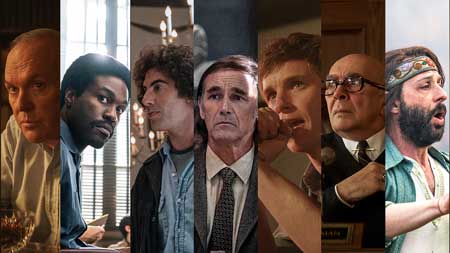Film (2020)
Written and directed by Aaron Sorkin
Netflix
Music by Daniel Pemberton; Cinematography by Phedon Papamichael; Film Editing by Alan Baumgarten
With Eddie Redmayne (Tom Hayden), Alex Sharp (Rennie Davis), Sacha Baron Cohen (Abbie Hoffman), Jeremy Strong (Jerry Rubin), John Carroll Lynch (David Dellinger), Yahya Abdul-Mateen II (Bobby Seale), Mark Rylance (William Kunstler), Joseph Gordon-Levitt (Richard Schultz), Ben Shenkman (Leonard Weinglass), J.C. MacKenzie (Thomas Foran), Frank Langella (Judge Julius Hoffman), Danny Flaherty (John Froines), Noah Robbins (Lee Weiner), John Doman (John Mitchell), Michael Keaton (Ramsey Clark), Kelvin Harrison Jr. (Fred Hampton)

Michael Keaton as Ramsey Clark
Yahya Abdul-Mateen II as Bobby Seale
Sacha Baron Cohen as Abbie Hoffman
Mark Rylance as William Kunstler
Eddie Redmayne as Tom Hayden
Frank Langella as Judge Julius Hoffman
Jeremy Strong as Jerry Rubin
Image: Courtesy of Netflix
In 1968, the Vietnam War is raging, Lyndon Johnson, who inherited the war from John F. Kennedy and amplified it, is president, and the Democratic National Convention is occurring in Chicago. A group of radical political and social leaders of different stripes, including Tom Hayden (Eddie Redmayne), Abbie Hoffman (Sacha Baron Cohen), Bobby Seale (Yahya Abdul-Mateen II), Rennie Davis (Alex Sharp), John Froines (Danny Flaherty), David Dellinger (John Carroll Lynch), Lee Weiner (Noah Robbins) and Jerry Rubin (Jeremy Strong), are put on trial for inciting a riot. The arbitrary, inconsistent and prejudicial Judge Julius Hoffman (Frank Langella) presides at their trial at which the major defendants are represented by lawyer William Kunstler (Mark Rylance).
The original script of this compelling courtroom drama was written by Aaron Sorkin in 2007 with the intent of producing a film directed by Steven Spielberg. A series of industry complications prevented the film from being made then, but it was finally put together under the direction of Aaron Sorkin and released by Netflix in 2020 during the pandemic. The results are admirable.
Sorkin’s usual authorial magic manages to create a kind of intense interpersonal drama out of this legal melee by characterizing Tom Hayden as a kind of goody two shoes once he gets inside a courtroom and before a judge. Many of the rest of the defendants – Jerry Rubin, Abbie Hoffman, and certainly Bobby Seale (not officially one of the Chicago 7, but brought along for the trial nonetheless) – are often vocal and demonstrative, while Hayden plays the good boy. It’s an effective dramatic strategy that, even though a bit manipulative and not quite adhering to the facts, in the end plays out in a satisfying way.
Some of the acting is exceptionally good, and a number of those are great British actors who provide compelling accounts of these distinctively American personalities.
Leading this pack is Mark Rylance who makes an extremely convincing William Kunstler, lead lawyer for the Chicago 7. He literally disappears into the role and manages to convey a radical and sharp Jewish New York defense attorney as masterfully as he conveyed Tudor-era courtier Thomas Cromwell in the magnificent 2015 series Wolf Hall.
Sacha Baron Cohen, known widely as the protagonist of the wildly satirical and unhinged Borat films which he wrote and directed as well, demonstrates here that he can very much command the screen as a straight actor. He has done so before in other roles, but here notably rises to the occasion as Abbie Hoffman, demonstrating the nuanced complexities of that character with deftness and intelligence.
The last of these three Brit actors to contribute significantly to this film is Eddie Redmayne as Tom Hayden. Redmayne played two demonstrative film roles in recent years to great acclaim, as Stephen Hawking in the The Theory of Everything (2014) and as a transsexual in The Danish Girl (2015). Here, as the buttoned down and very self-consciously serious Tom Hayden, Redmayne has a different sort of challenge, and manages to pull off the general portrayal, and the character’s role in the dramatic denouement, very well.
As the impossibly prejudiced and difficult Judge Julius Hoffman, Frank Langella does an excellent job of conveying Hoffman’s intransigence along with a wink of irony. In an important cameo role, Michael Keaton bats it home with a stellar portrayal of Attorney General Ramsey Clark, the defense’s star witness. As the wrongly treated Bobby Seale, not officially a member of the Chicago 7 but included in the trial without his chosen lawyer present, Yahya Abdul-Mateen II is vivid and strong.
Though the courtroom drama aspect of the film is very well done, there is, for those who know the era well, something about the pitch of political anguish surrounding it that does not quite come through, thereby making what goes on in this courtroom story seem a bit contained. Furthermore, the constrained and manipulated portrayals of SDS-niks Tom Hayden and Rennie Davis, though effective for dramatic purposes, serves the drama at some expense to the history. Here, Abbie Hoffman comes off stronger as an articulate exponent of revolution, while Hayden and Davis are shown as ideological sticks in the mud who are neither particularly charismatic nor forthright. Hoffman was certainly a colorful character, and sharper than he was sometimes portrayed; but Hayden, a serious politico, was sober and serious, but not as sheepish as the script indicates.
Nonetheless, despite some of these liberties taken with the facts to make a courtroom drama dramatic, the film is excellent, exhibiting, of course, Sorkin’s writing talents and the talents of some great actors, but also shows Sorkin’s capacities as a director, a fairly new role for him.
– BADMan (aka Charles Munitz)
Leave a Reply